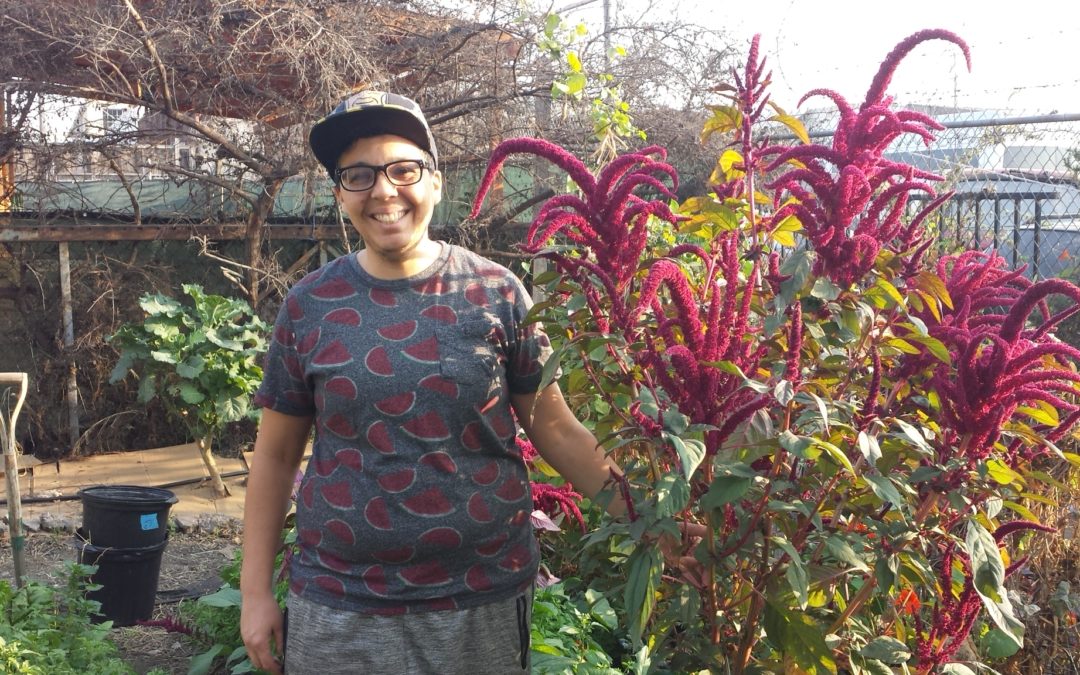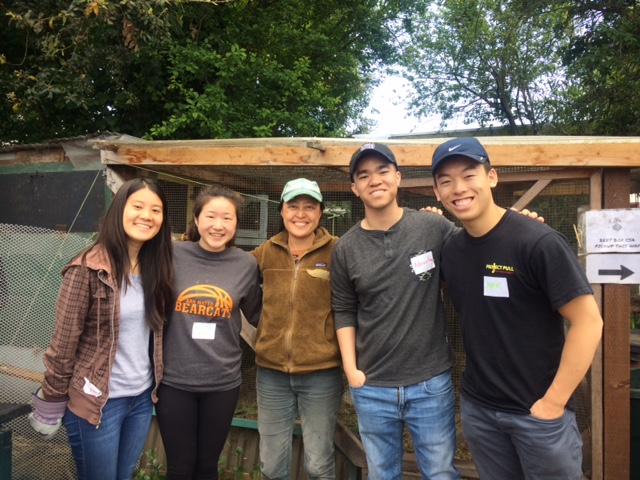
Oakland SOL and Leo Orleans
I caught up with farmer Leo Orleans at their 6-person collective residential and community space called Oakland SOL (Sustaining Ourselves Locally) in the San Antonio neighborhood of Oakland. The collective is home to Queer and Trans People of Color who run arts and gardening programs out of the center. Oakland SOL was a mini-grant recipient through our Resilient Hubs Initiative to support neighborhood models of resilience. I got a tour and a conversation after their workday to install a drip irrigation system in their sizable backyard farm.

What is Oakland SOL?
It’s a sustainability project that was started 15 yrs ago by a group of mixed race folks who wanted to live as a sustainable home. They turned an empty lot into a garden, and this is still going. Over time it became obvious that this needed to be a space that was safe for Queer and Trans People of Color. And it’s been a QTPOC space for at least 6-7 years. We have a youth program that we run in the summertime. We serve youth of color and we have a community garden day once a month.
Is the youth program around gardening?
It is, they come twice a week and help us upkeep the garden, and help us develop projects that we want to work on. This year they built a trellis and last year they helped revamp the chicken coop to make it twice as big as it was before.
What’s your background and what areas are you involved in here?
For me the fact that this was a space for Queer and Trans People of Color attracted me. But also there’s a garden in the back. For me the desire and action a community takes towards autonomy, self-preservation, sustainability and along with that preserving our own cultural heritage like preserving food and seed saving, was politically and personally interesting. Just believing that these skill sets are totally valuable for our survival and what we need to move into in our future.
Tell me about the garden. What’s the history and vision?
So it’s been here for 15 year and there used to be a functioning greenhouse and they used to give away food to the community. But there were a lot of projects that got abandoned, or the information about how to manage it was not passed on. So at this point the real work in the garden is to redesign the garden for accessibility, for ADA, children and adult learning. The goal is to have a hoop house that would serve as a propagation and nursery production so we can do seed saving and share starts consistently. Another is to have a comprehensive 3-compartment compost site, and make it really like a closed loop system. Get our chickens back in for compost as well.
Also design the yard so that there is a manual to go to, that these systems are easy to learn and maintain. I think to really have this as an educational hub so that folks understand more about the political nature of food systems and how if there is desire to move towards autonomy and self-sustainability, that there is a real empowerment in being able to grow your own food and collect and conserve water. And also developing so that we can give away a lot of the produce we are growing, and have a production site so more jobs can happen and we can have some economic viability.
Currently who comes to the work parties?
I don’t notice that a lot of people from the immediate neighborhood come to the work parties, but it is a lot of QTPOC community folks. We do make an effort to serve the communities of color who are here, while being explicit that this is a Queer and Trans POC led space.
As a Resilience Hub site that is neighborhood-based, do you see yourself doing more outreach to the neighbors who live around here?
Part of our youth program is having relations with the East Side Arts Alliance which is around the corner. They will often come to our site even to use the storefront space. I think that we can build more program that’s connected to our immediate neighborhood, but I would say that the way that we do that at the moment is to connect with the organizations that are in touch with the youth here. The youth don’t necessarily always live right around here, but they have done programming that’s right in the neighborhood. Another thing that SOL has done is some programming with the Village, the homeless encampment on 23rd and E 12th [which moved to deep East Oakland before being evicted from their site once again] to offer a gathering space and periodically bring meals over there. But we need more infrastructure as SOL before we can consistently connect with our community in the area. The other thing that’s unique about our space is that we are very much program-based.
So recently, SOL along with the other organizations bought this building. Tell me about that.
We partnered with Oakland Community Land Trust to make the purchase of the building. First phase was acquisition. And now we are in our second phase of learning how to manage the building as a collective. Those are very slow moving steps and takes a lot of focus and investment. Any collective or collaborative effort I’ve known about has never followed one step-by-step process. We’re just trying as little people to understand our power.
Who are the other organizations co-owning the building?
There are 8 residential units and 4 commercial spaces. SOL is one of the commercial spaces and occupies some of the residential units as well. There’s also Liberating Ourselves Locally (a QT maker space), Peacock Rebellion (Trans women arts collaborative), Shaolin Temple (Qigong and Kung Fu school), and the Bikery (community bike shop, a program of Cycles of Change). By and large all these projects are QT and POC led.
What does it mean to have bought this building as rent prices are skyrocketing and even this area of Oakland has been going through a lot of gentrification?
Well there’s a building being built right in front of us so I don’t know how that’s going to affect the demographic. I think it’s incredible that this happened, and we had a lot of things in our favor. The seller of the building was willing to accept our first offer, and we were given the opportunity to be the first ones to put a bid in.
What is it that Oakland SOL needs to materialize the next phase of the vision?
I feel very limited as the main garden person because I don’t have transportation to go pick up supplies. We really need mulch in our yard and the support to get it here. We need soil, manure from the horse stables and a way to get it here, cover crop, and we do need various labor. I’m trying to find ways to open the space, because right now we can’t just leave it open for people to come in and work. We need people for financial plan to figure out what steps to take. We need someone who knows how to prune large trees properly and safely. And production infrastructure, like a commercial walk-in refrigerator, or a storage freezer. These are all a part of our general vision. And having a consistent person to help with outreach and media.
So if someone wants to volunteer at the Oakland SOL garden every 2nd Sunday, should they just show up, and what would you like for them to know?
Yeah, folks usually just show up. And we really focus on serving communities of color, and that’s really our goal is to have this space for POC and QTPOC. So people should know to show respect for our politics and capacity, and to ask people for their pronouns I think is a really big deal. We want to learn together in the garden and not feel like we are challenged around these things. We want to keep this as a space that’s a protected and where we feel joy and unchallenged to move about freely.
You can visit Oakland SOL online: http://oaklandsol.weebly.com/
Or on their FB page: www.facebook.com/Oakland-SOL-Sustaining-Ourselves-Locally-1521617184779276/

